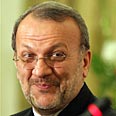
Iran hints at compromise in nukes dispute
Iranian Foreign Minister Manouchehr Mottaki tells the Iranian news agency IRNA that 'Iran is ready to reach multilateral agreements'
With four days left on the expiry of an ultimatum handed by the United Nations Security Council to Iran over its nuclear activities, Iran continues of broadcast inconsistent and confusing messages.
After comments by the Foreign Ministry spokesperson on Sunday that his country's uranium enrichment program is irreversible, Iranian officials hinted Monday the compromise is possible.
Iranian Foreign Minister Manouchehr Mottaki told the Iranian news agency IRNA that "Iran is ready to reach multilateral agreements."
"The Iranian nuclear issue should be discussed at the International Atomic Energy Agency but a united diplomatic decision brought the issue to the Security Council," Mottaki added, and expressed hopes the nuclear dispute will find its natural place.
A senior Iranian official on Monday said "Iran has no problem in delaying uranium enrichment for a shirt period of time, but the problem is that the west and the United States will abuse this."
"The west's final objective is to see Iran incapable of completing it uranium enrichment plan," said Hassan Rouhani, Secretary of the Supreme National Security Council of the Islamic Republic.
Monday afternoon, Iranian President Mahmoud Ahmadinejad will take part in a press conference during which he is expected to take an announcement, apparently related to the ultimatum handed by the United Nations.
On Tuesday, the IAEA will report to the U.N. whether Iran is complying with a resolution demanding it halts uranium enrichment.
U.S. seeks sanctions
The United States and other western countries are bidding to impose U.N. economic and diplomatic sanctions on Iran. But Russia and China remain opposed to far-reaching steps against Iran and are likely to veto a draft resolution for sanctions against Tehran.
Over the weekend Russian Foreign Ministry spokesman Mikhail Kamynin said, "One can speak of sanctions only after the appearance of concrete facts proving that Iran is not engaged exclusively in peaceful nuclear activities," the ITAR-Tass news agency reported.
The U.S has begun planning its own moves to face the conflict against Iran, not military moves but rather economic ones. Time Magazine reports that next month the U.S and the European Union will ask the U.N Security Council to pass a resolution that will pave the way to economic and political sanctions against Iran.
As senior official involved in the economic sanctions told Time Magazine that the U.S. needs to convince the big financial institutions to stop dealing with the "bad guys" if they're concerned with their good names.
Economic sanctions, he added, could impede Iran's ability to purchase technology and knowledge from outside sources.
Outgoing Defense Minister Shaul Mofaz supported the Meridor Committee report which ruled that a nuclear Iran will set off an arms race in the Middle East. The report also recommended Israel continues with its vague policy on the issue in order to quell international demands that it dismantles its weapons arsenal for the sake of the whole region.










